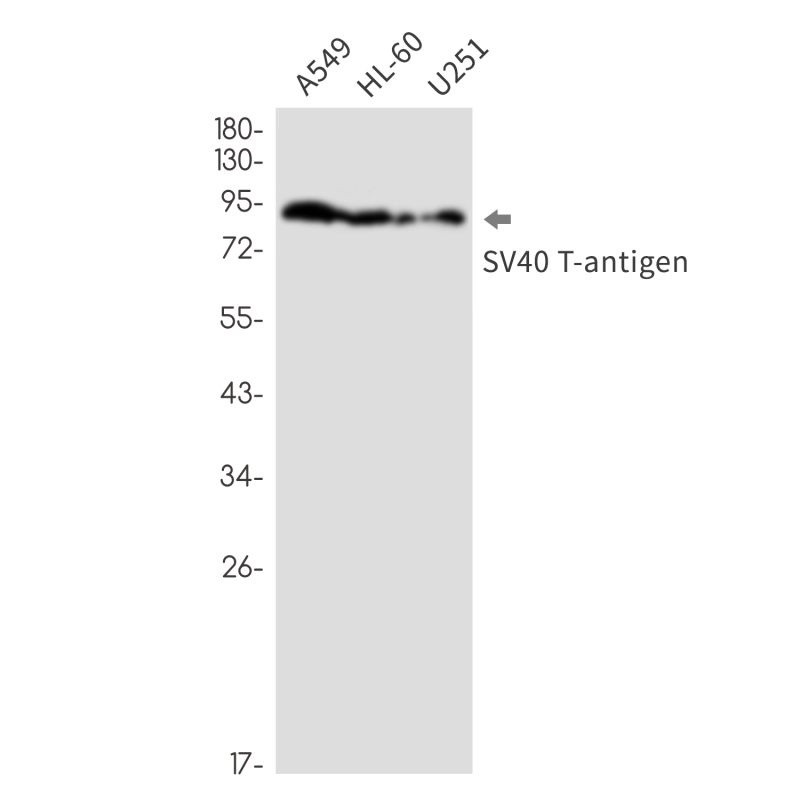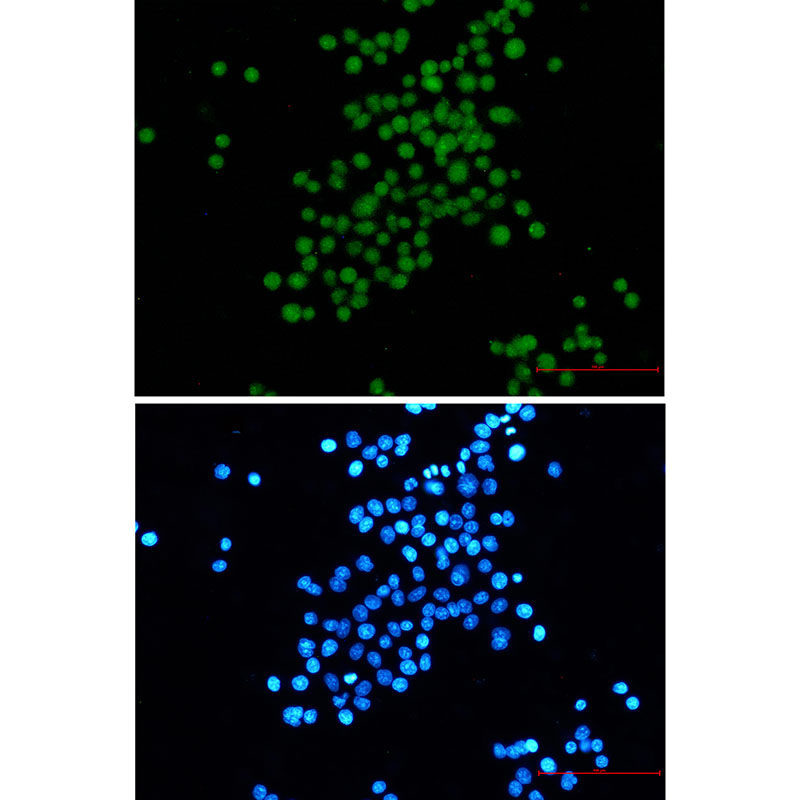

| WB | 1/500-1/1000 | All |
| IF | 1/20 | All |
| IHC | 咨询技术 | All |
| ICC | 1/50-1/200 | All |
| FCM | 咨询技术 | All |
| Elisa | 咨询技术 | All |
| Aliases | Large T antigen; LT; LT-AG |
| Entrez GeneID | 29031019 |
| WB Predicted band size | Calculated MW: 82 kDa; Observed MW: 90 kDa |
| Host/Isotype | Rabbit IgG |
| Antibody Type | Primary antibody |
| Storage | Store at 4°C short term. Aliquot and store at -20°C long term. Avoid freeze/thaw cycles. |
| Species Reactivity | All |
| Immunogen | A synthetic peptide of SV40 T-antigen |
| Formulation | Purified antibody in TBS with 0.05% sodium azide,0.05%BSA and 50% glycerol. |
+ +
以下是与SV40 T抗原抗体相关的3篇经典文献,简明扼要地列出了研究内容:
---
1. **文献名称**:*Monoclonal antibodies specific for simian virus 40 tumor antigens*
**作者**:Harlow, E., Crawford, L.V., Pim, D.C., & Williamson, N.M.
**摘要**:该研究首次报道了针对SV40大T抗原和小t抗原的单克隆抗体制备,并验证了其在免疫沉淀和Western blot中的应用,证实T抗原与细胞p53蛋白形成复合物,为后续肿瘤病毒机制研究奠定基础。
---
2. **文献名称**:*The retinoblastoma protein is phosphorylated during specific phases of the cell cycle*
**作者**:DeCaprio, J.A., Ludlow, J.W., Figge, J., et al.
**摘要**:通过SV40 T抗原特异性抗体,研究发现T抗原直接结合并抑制视网膜母细胞瘤蛋白(Rb),揭示了病毒致癌蛋白通过干扰细胞周期调控蛋白促进细胞增殖的分子机制。
---
3. **文献名称**:*T antigen is bound to a host protein in SV40-transformed cells*
**作者**:Lane, D.P., & Crawford, L.V.
**摘要**:利用多克隆抗体进行免疫沉淀实验,首次发现SV40大T抗原在转化细胞中与宿主蛋白p53形成稳定复合物,提示p53在肿瘤发生中的潜在作用,为肿瘤抑制蛋白研究开辟新方向。
---
这些文献展示了SV40 T抗原抗体在揭示病毒致癌机制中的关键应用,包括蛋白互作、细胞周期调控及转化研究。
The Simian Virus 40 (SV40) T Antigen is a multifunctional oncoprotein encoded by the early region of the SV40 DNA virus, first identified in 1960 as a contaminant in poliovirus vaccines. It exists in two isoforms: large T antigen (∼90 kDa) and small T antigen (∼20 kDa), generated via alternative splicing. Large T antigen is critical for viral replication by binding to the viral origin of DNA replication and recruiting host DNA polymerase. It also promotes cell cycle progression by inactivating tumor suppressor proteins p53 and Rb family members, driving uncontrolled proliferation—a hallmark of its oncogenic potential. Small T antigen complements these effects by perturbing cellular signaling pathways, including PP2A phosphatase inhibition.
SV40 T Antigen antibodies are essential tools in virology and cancer research. They are widely used to detect T antigen expression in SV40-infected cells or transgenic models expressing the protein. These antibodies enable applications like immunoprecipitation, Western blotting, and immunofluorescence to study viral replication mechanisms, oncogenic transformation, and interactions with host proteins. In cancer biology, SV40 T antigen-expressing cell lines (e.g., COS-7) and transgenic mice are employed to model tumorigenesis, with antibodies serving to validate T antigen presence in experimental systems. Their specificity and reliability make them indispensable for probing SV40 biology and virus-host interactions.
×